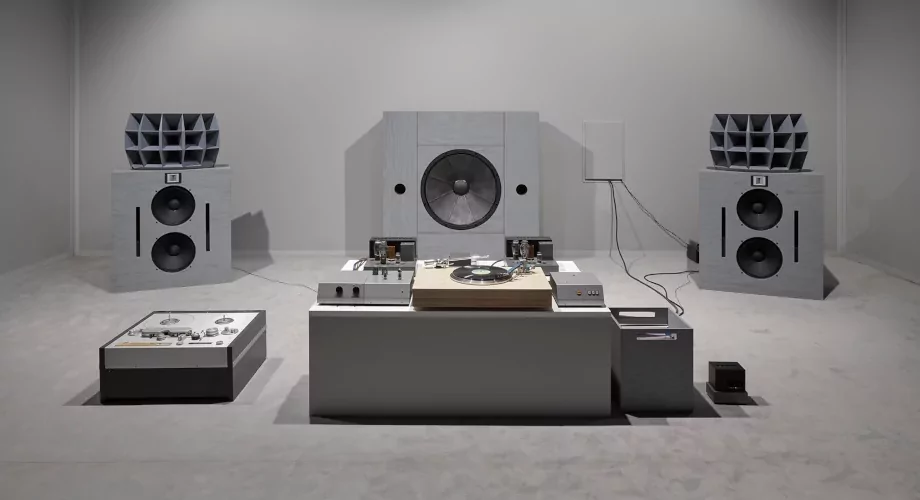Published on
May 22, 2019
Category
Features
For absolute beginners and ambitious solderers alike.
Less than 30 years ago, the only people building synthesizers were serious audio aficionados. It was all quite expensive, parts were hard to find, and guidance was unlikely. The DIY market today paints a different picture: many companies produce simplified synth kits, there is lots of support from online communities, and it’s not uncommon for universities and cultural institutions to host audio workshops. If anything, the sheer amount of information available on the topic is overwhelming.
For those interested in making their own synthesisers, but not entirely sure where to start, consider this list an entry point into the world of DIY. From kits that need only a screwdriver for assembly to more complex units that require a knowledge of circuitry, here are eight analogue synthesizers you can build at home.
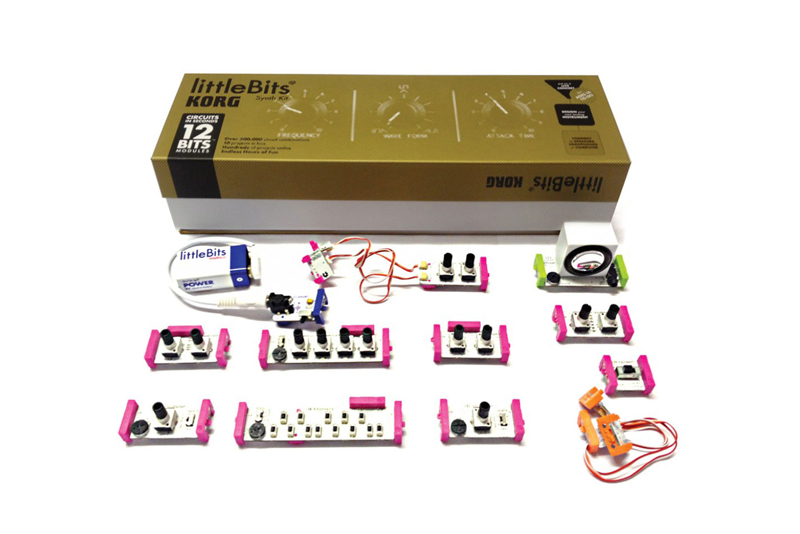
littleBits – Synth Kit
Level: Absolute Beginner
Cost: £123
Perhaps too simple to be considered DIY in purist circles, the littleBits Synth Kit is a great tool for newcomers looking to experiment with the possibilities of synthesizers. Developed in partnership with Korg, it comes with 12 interchangeable modules called “bits” that snap together using magnets, so your first sound is only seconds away. Each bit has a single function (for example, an oscillator, a micro sequencer, an envelope etc.) and includes a mounted circuit board and controls to tweak the signal to taste.
The sonic results, much like the modules themselves, are cute and playful, but you can also produce some pretty gnarly analogue sounds with the right moves. Though you won’t really learn anything about soldering or electronical components, the manual offers ten unusual Synth Kit projects, like combining modules with household items to create a toy keytar, leaving lots for curious minds to explore.
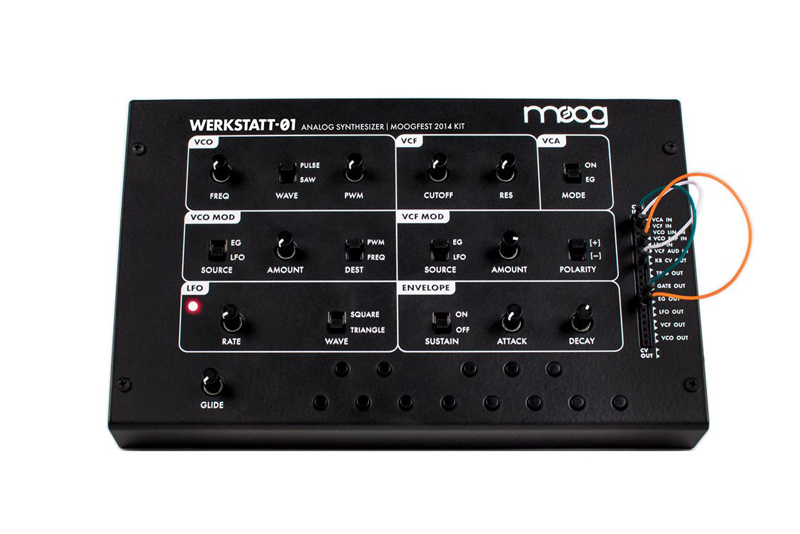
Moog – Werkstatt-01
Level: Absolute Beginner
Cost: £154
Want to learn more about how synths work and get the classic Moog sound at a bargain price? Then the Werkstatt-01 might be for you. Though originally created as an educational tool for workshops, Moog received so many requests to bring the kit to market, they started shipping it as a compact DIY synth. The Werkstatt-01 offers many of the basic components found in other Moog synthesizers and excels at creating the bleeps, drones, and deep basses associated with the Moog name. It has a single analogue oscillator which can be tuned between 8 and 16 Hz and switched between saw and square waveshapes. There’s also an LFO and a 4-pole ladder filter with cutoff and resonance. The synth kit is patchable too, meaning you can connect this-to-that to generate new sounds.
It’s no secret that the Werkstatt-01 is easy and quick to construct. The main components are already assembled, requiring only a screwdriver and pair of scissors to stitch them together. For those seeking a greater electronics thrill, Moog has an entire website dedicated to modifications, making this synth the perfect middle ground between performance and tinkering.
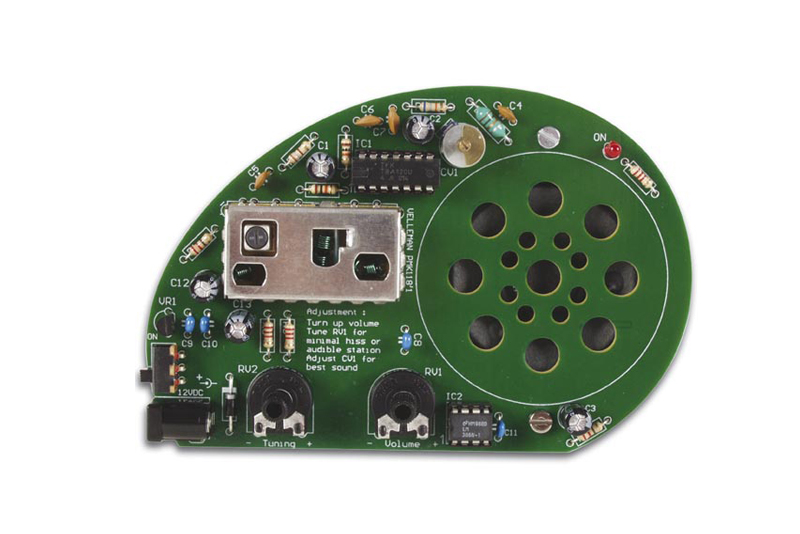
Velleman – Mini Kits
Level: Beginner
Cost: £5 and up
With soldering tools and a bit of patience, you can have a go at the DIY Mini Kits from Velleman. Having supplied “makers, hobbyists, and geeks” with electronic kits since the 1970s, they have dozens of simple and creative stand-alone audio activities (rated on a difficulty scale of 1-5) that prepare you for bigger projects. Start at the ground level and build a Signal Generator that outputs either a sine wave, triangle wave, or square wave. Or simulate the sounds of crickets chirping with the Electronic Cricket Minikit.
If that doesn’t interest you, maybe altering the tone and pitch of your voice with the Voice Changer will. No matter the pick, Velleman has outlined the best DIY practices and basic tools needed to build Mini Kits in a beginner’s guide for you to read. If you don’t want to solder, look into getting a getting a breadboard, which is a testing base for building temporary circuits. Essentially a piece of plastic with little holes in it, you can easily insert and assemble circuits without bonding them together.
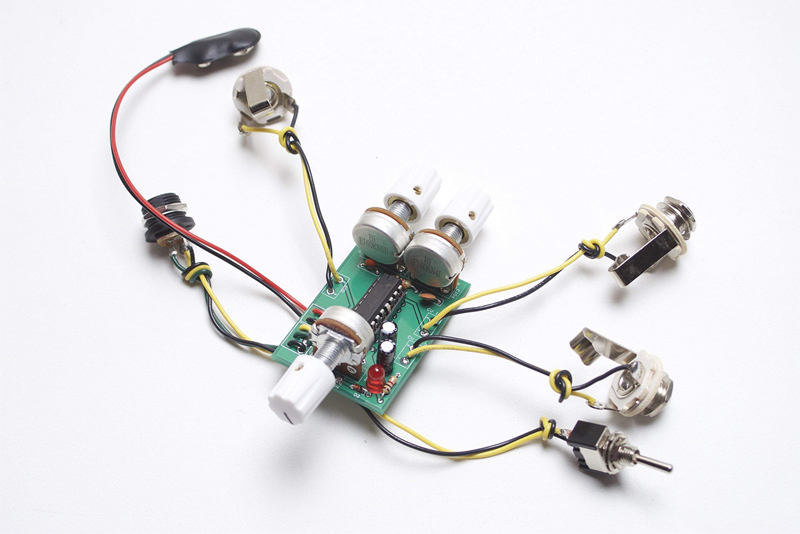
Synthrotek – Atari Punk Console
Level: Beginner
Cost: £20
Cheap, noisy, and easy to build, the Atari Punk Console is one of the most popular DIY synths for beginners. The circuit (originally called the “Sound Synthesizer” and later, the “Stepped Tone Generator”) was first published in a 1970s Radio Shack DIY booklet, but is now sold in kit form by many vendors. With a handful of spare parts, you can also built the APC for about £20, a route many chose to take since the synth can be modified and enclosed in unusual cases without hassle. Some basic soldering is required (you need to supply tools) and the whole building process takes about an hour.
From two main controls — one for oscillator frequency and another for pulse width — the synth allows you to generate raspy, chaotic square wave tones reminiscent of old Atari console gameplay. With a CV input for step sequencers, you can expand the sonic palette with 8-bit arpeggios and other bleepy patterns.
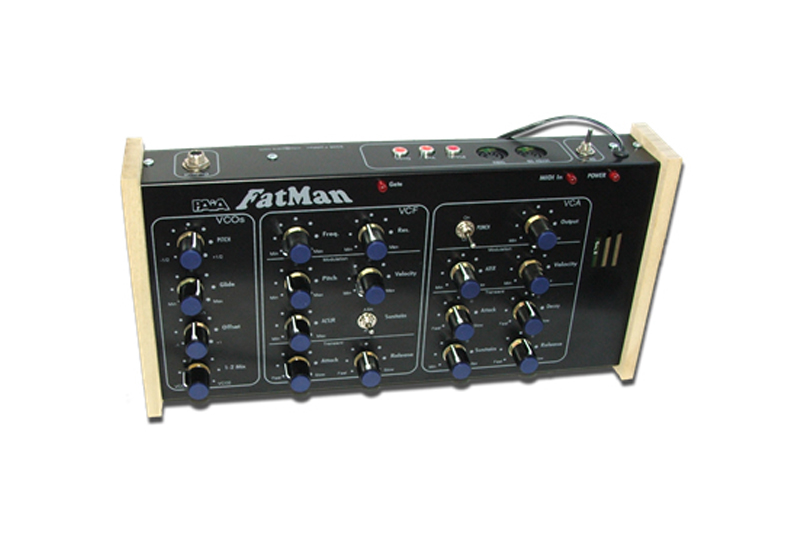
PAiA – Fatman
Level: Intermediate
Cost: £25 (rack mount) and £158 (desktop)
Depending on your soldering skills, it takes anywhere from six to forty hours to build the Fatman, a monophonic MIDI-controlled analogue synth from PAiA, who have been shipping out electronic kits since the 1960s. Available as both a rackmount and desktop unit, it is capable of producing a wide range of charming, warm tones reminiscent of early electronic and kosmische music. It also delivers fat, punchy bass.
If you’re just getting the hang of soldering, this synth kit is a good option for you to further your skills. Even those without experience should make it through (the PAiA website claims “most of our kits assume that you don’t know a thing about electronics”), learning loads from the supportive tips and design insights in the FatMan manual. Worst case scenario, the good people at PAiA will repair recently bought kits for 20% of the purchase price. From the musicians perspective, the 16 knobs on the synth are well-suited to restless beginners who want to quickly discover new sounds and hear immediate results. The Fatman is also mod-friendly, with many users sharing their accomplishments on forums and other corners of the web.
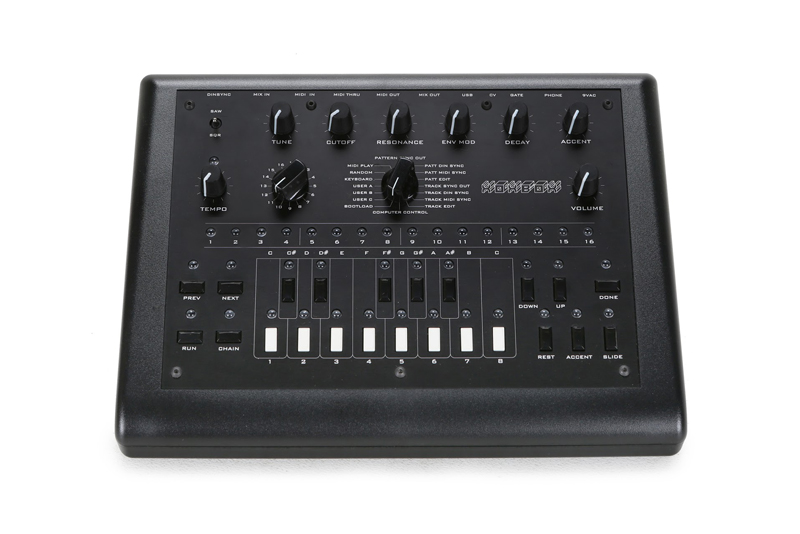
Ladyada – x0xb0x
Level: Intermediate
Cost: £100-200
With the cost of a TB-303 well out of range for most, the x0xb0x kit is an ideal choice for those looking to get an authentic acid squelch without breaking the bank, all while sharpening their DIY skills. The x0xb0x (pronounced “zocks-box”) is a reproduction of the original Roland machine, involving as many of the original components as possible, plus a sequencer to control other synths. After nine releases of 100 kits, Ladyada no longer creates them, choosing instead to place the synth under an open-source license and release all the required documentation to build it.
You can find original and modified kits (like the x0xi0) floating around online or roll up your sleeves and track down the parts separately. There are lots of parts, but most are not that hard to find, and Ladyada lists the distributors and manufacturers on the “parts” page of the x0xb0x website. Whatever you do, this project is for those who have already built a few kits and feel comfortable with their soldering equipment. From start to finish, expect 10 hours of work. If you get stuck, there are x0xboxers available for help in the right forums.
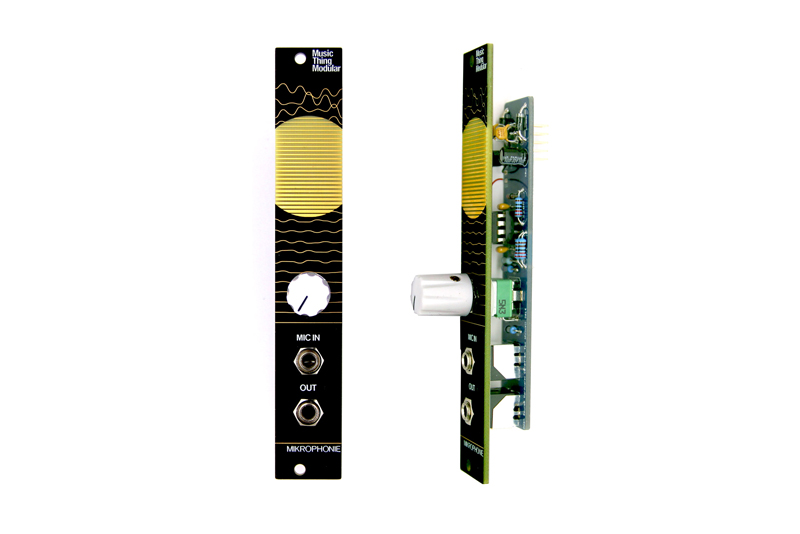
Music Thing – Mikrophonie
Level: Intermediate
Cost: £27.50
If you’re a modular head keen to dabble in DIY, Music Thing offers a variety of straightforward kits, with Mikrophonie being the simplest to start with. It’s a microphone pre-amp whose output is derived from a scratchable mic on the front panel. As you touch, flick, or scrape the mic with either your finger or a plectrum, you get a wide range of sounds in return, which become particularly interesting with the aid of effects.
And if you’re looking to integrate environmental sound into your music, the mic also picks up the acoustic waves surrounding a modular system, like switches and the rustling of cables, without amplifying the output (unless you really crank it up). Though not exactly a synthesizer, it is a stepping stone for you to start designing more significant sound-emitting modules later on. A unique addition to your system, Mikrophonie takes about an hour to put together.
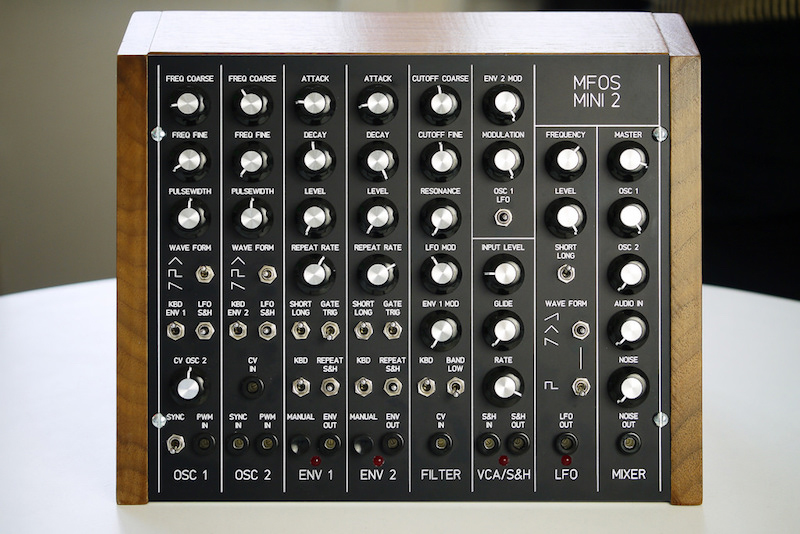
Music From Outer Space – Sound Lab Mini-Synth Mark II
Level: Intermediate-Advanced
Cost: £170
A single board analogue synth with the essential functions of a modular, the Sound Lab Mini-Synth Mark II is perfect for anyone looking for a medium-term project. Though the Music From Outer Space website states that only the schematic, circuit description, and panel layout are provided, you can find full kits with all the necessary parts on Soundtronics, who model synths based on MFOS designs.
Like most DIY projects of this size, the synth comes with a warning tag stating that troubleshooting skills, an understanding of electronics, and access to tools are all required. Depending on how much time and effort you devote, you will have an impressive two-oscillator analogue synth within a matter of days. Other features include a white noise generator, a mixer, multiple filters, an LFO, and keyboard input controls. Since the Mark II is an all-in-one system, you can’t add to it like a proper modular, but it will certainly keep you interested if you are a performer or electronic composer. MFOS also offer modular bundle kits if that’s your thing.

